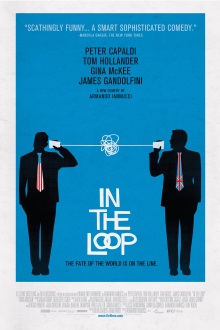
This one was a recommendation from Broken Forum and its director Armando Iannucci has been in the news lately due to his newest film The Death of Stalin. Unfortunately I couldn’t find a copy of it so it’s still sitting on my watch list. I’ve never watched anything else by him but it looks to me that he has made a career out of satirizing politics and this film was a spin-off from a successful British television series.
During a radio interview, the British Minister for International Development Simon Foster states that war in the Middle East is ‘unforeseeable’. This sets off the foul-mouthed Director of Communications Malcolm Tucker who lambasts him for not toeing the official line. Meanwhile Toby Wright starts working as the minister’s aide and immediately jostling for power with Judy Molloy, the minister’s own communications director. Over in the US, Karen Clarke, an assistant secretary of state, who is opposed to war takes Foster’s interview to mean the British supports her. She suspects that her rival in the State Department Linton Barwick has started a committee to plan for the upcoming war. Clarke’s advisor Liza Weld has written a policy paper that argues against the war and Clarke uses this to try and argue against the war. They discover the place and time of Barwick’s ‘war committee’ meeting and even invite Foster and Wright to join in, expecting them to be allies. Meanwhile Foster also has to deal with a constituent who is upset about a collapsing wall and Wright has to deal with the fallout with his girlfriend after sleeping with Weld while in the US.
This is a fast-paced film with rapid-fire dialogue and lots of characters so it can feel a bit hectic. Thanks to captions denoting their names and positions plus the fact while the events depicted here are clearly inspired by the Iraq War the precise details don’t actually matter, following along isn’t too difficult. A great deal of the fun of the film is watching how all these senior figures with their hands on the lever of power, never miss a chance to insult and denigrate one another, behaving like utter schoolchildren. Tucker in particular is such a non-stop expletive spewing machine that it’s a wonder how he doesn’t run out of spittle. Every character, with the possible exception of Barwick, is a hypocrite and a liar whose sole motivation is advancing their respective careers. This is mostly accomplished by ensuring that they don’t look bad in front of their superiors and most importantly in the eyes of the public. Government, in this view, consists mostly of careening blindly from one crisis to another and watching this train wreck up close is stupidly, wickedly fun..
As much as I would like to believe that this is a realistic portrayal however, I have my doubts. Not over the character faults of politicians and bureaucrats but over whether or not they truly are so impoverished in terms of the resources they are able to draw on. This is a scenario that could only plausibly work for Britain, being an acknowledged world power and yet with ministers who are relatively poor. A lot of the humor here comes from Foster being discombobulated as a minister, being so new to power and privilege that travelling in a motorcade is worth squeeing over and only has a single aide following him around so he has to pretend to be busier and more connected than he really is. In a country like Malaysia for example, I would expect the typical minister to be wealthy, possess significant business interests and therefore have access to plenty of staff members and advisors who will constantly hang around as part of an extensive entourage. A Malaysian minister would certainly be powerful enough not to pay the slightest bit of attention to a constituent complaining about a mere wall.
The depiction here is idiosyncratic to Britain in plenty of other ways as well. Tucker wields such terrifying power over Foster only because the British political class live in fear of what the press writes about them. At the same time, Tucker turns out to be a toothless tiger when he faces Barwick, revealing that Britain truly is a lap-dog to the US when it comes to foreign policy. It’s all great stuff of course but it wouldn’t really apply to other countries. Another oddity is that the decision to go to war is really only up to the US. Barwick made up his mind long before this and seems to have all the necessary support. Tucker and Foster, though he goes into it blindly, end up enabling him but ultimately what they do doesn’t really matter. The entire British side is a side-show but I suppose that too is part of the point.
Anyway I truly enjoyed this and I’m intrigued by the thought of more the same from the television show. I doubt however that my wife would agreeable to so much politics.